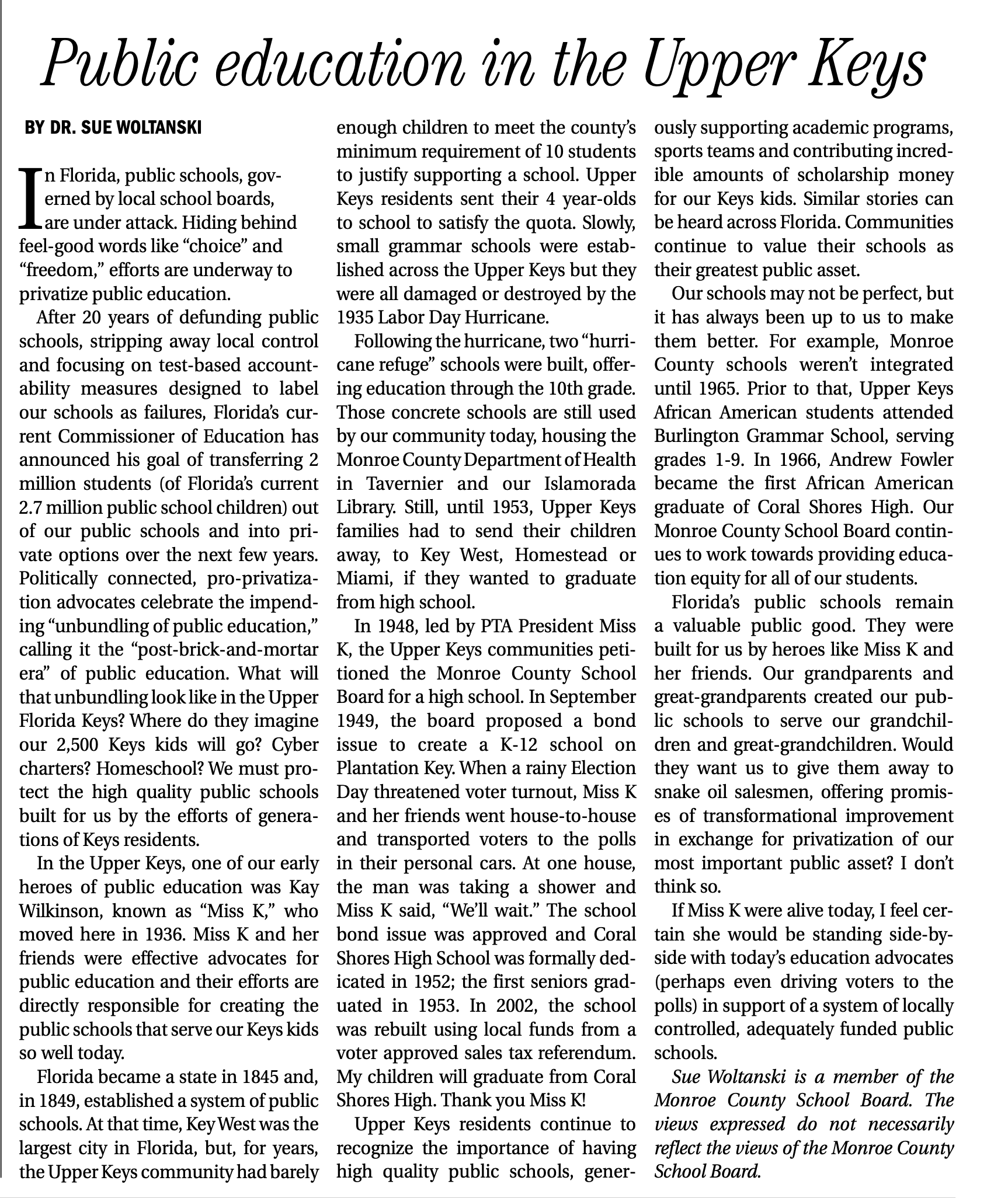Heroes, like Miss K, Built Our Schools
In case you missed it, published in the Key West Citizen on Saturday, January 18, 2020:
“In Florida, public schools, governed by local school boards, are under attack. Hiding behind feel-good words like “choice” and “freedom,” efforts are underway to privatize public education. After 20 years of defunding public schools, stripping away local control and focusing on test-based accountability measures designed to label our schools as failures, Florida’s current Commissioner of Education has announced his goal of transferring 2 million students (of Florida’s current 2.7 million public school children) out of our public schools and into private options over the next few years. Politically connected, pro-privatization advocates celebrate the impending “unbundling of public education,” calling it the “post-brick-and-mortar era” of public education. What will that unbundling look like in the Upper Florida Keys? Where do they imagine our 2,500 Keys kids will go? Cyber charters? Homeschool? We must protect the high quality public schools built for us by the efforts of generations of Keys residents.
In the Upper Keys, one of our early heroes of public education was Kay Wilkinson, known as “Miss K,” who moved here in 1936. Miss K and her friends were effective advocates for public education and their efforts are directly responsible for creating the public schools that serve our Keys kids so well today.
Florida became a state in 1845 and, in 1849, established a system of public schools. At that time, Key West was the largest city in Florida, but, for years, the Upper Keys community had barely enough children to meet the county’s minimum requirement of ten students to justify supporting a school. Upper Keys residents sent their 4 year olds to school to satisfy the quota. Slowly, small grammar schools were established across the Upper Keys but they were all damaged or destroyed by the 1935 Labor Day Hurricane.
Following the hurricane, two “hurricane refuge” schools were built, offering education through the 10th grade. Those concrete schools are still used by our community today, housing the Monroe County Department of Health in Tavernier and our Islamorada Library. Still, until 1953, Upper Keys families had to send their children away, to Key West, Homestead or Miami, if they wanted to graduate from high school.
In 1948, led by PTA President Miss K, the Upper Keys communities petitioned the Monroe County School Board for a high school. In September 1949, the board proposed a bond issue to create a K-12 school on Plantation Key. When a rainy Election Day threatened voter turnout, Miss K and her friends went house-to-house and transported voters to the polls in their personal cars. At one house, the man was taking a shower and Miss K said, “We’ll wait.” The school bond issue was approved and Coral Shores High School was formally dedicated in 1952; the first seniors graduated in 1953. In 2002, the school was rebuilt using local funds from a voter approved sales tax referendum. My children will graduate from Coral Shores High. Thank you Miss K!
Upper Keys residents continue to recognize the importance of having high quality public schools, generously supporting academic programs, sports teams and contributing incredible amounts of scholarship money for our Keys kids. Similar stories can be heard across Florida. Communities continue to value their schools as their greatest public asset.
Our schools may not be perfect, but it has always been up to us to make them better. For example, Monroe County schools weren’t integrated until 1965. Prior to that, Upper Keys African American students attended Burlington Grammar School, serving grades 1-9. In 1966, Andrew Fowler became the first African American graduate of Coral Shores High. Our Monroe County School Board continues to work towards providing education equity for all of our students.
Florida’s public schools remain a valuable public good. They were built for us by heroes like Miss K and her friends. Our grandparents and great-grandparents created our public schools to serve our grandchildren and great-grandchildren. Would they want us to give them away to snake oil salesmen, offering promises of transformational improvement in exchange for privatization of our most important public asset? I don’t think so. If Miss K were alive today, I feel certain she would be standing side-by-side with today’s education advocates (perhaps even driving voters to the polls) in support of a system of locally controlled, adequately funded public schools.”

